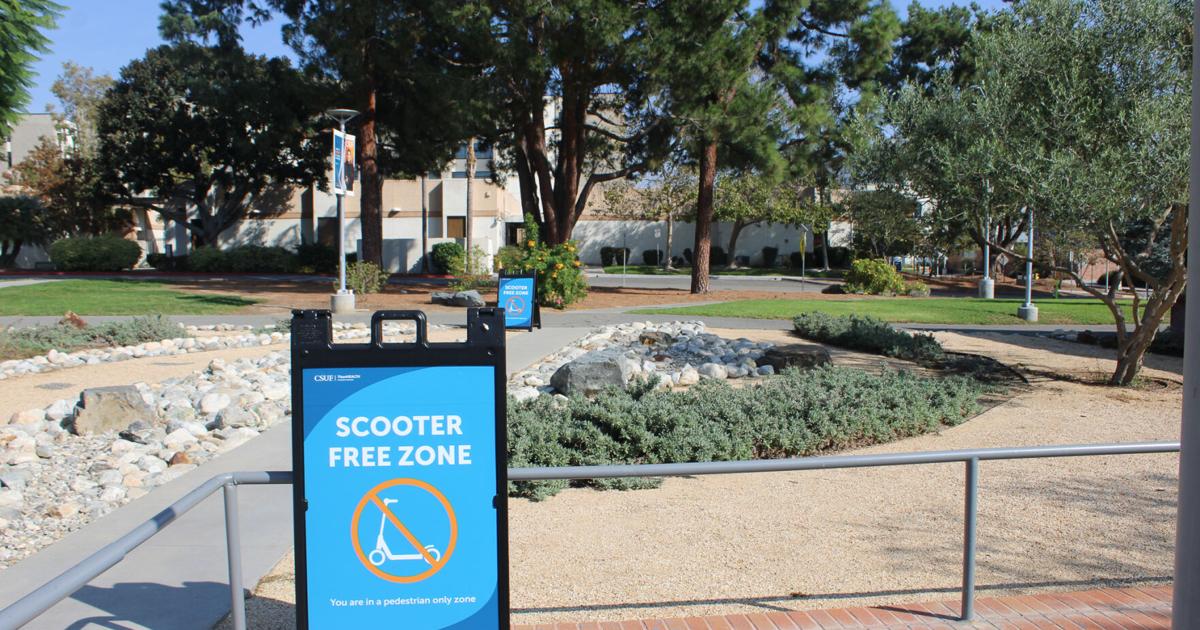The Cal State Fullerton Academic Senate discussed the potential creation of a need-based, or an ad hoc, committee to tackle safety concerns for students who use alternative methods of transportation, particularly electric scooters.
The committee, suggested by CSUF President Ronald Rochon, would involve both students, staff and faculty to draft a policy proposal for the university.
Rochon stated the importance of the committee for students who rely on electric scooters and other alternative forms of transportation.
“I am sensitive to this, that … for some of our students, the only way they are able to travel — they have no car,” Rochon said. “What we can do, with regard to enhancing safety and expectations, is going to be very, very important.”
Discussions on actions campuses can take to ensure safety have flared up around Fullerton due in part to a recent accident that critically injured two CSUF students on electric scooters on Sept. 27.
Rochon also shared news of another recent accident involving a student on an electric scooter.
Associated Students Representative for Academic Senate Juan Salguero, who also serves on the Chief Advisory Board, spoke about the board’s recent efforts to strategize ways students can be made more aware of existing rules and regulations for electric scooter use on campus.
Both Rochon and Salguero emphasized that while the students involved in accidents are at no fault, there is a noticeable lack of pedestrian safety on campus. These issues range from people using alternative forms of transportation to weave through pedestrians to people not looking both ways when they cross intersections.
Some members of the senate, such as Professor Joao Barros, argued that the issue of scooter safety also ties into parking issues at CSUF.
“Parking is very expensive. The students park in neighborhoods that are far away and then they need to get on scooters to come to campus because they cannot afford parking,” Barros said.
Barros also mentioned that the time pedestrians have to cross an intersection might not be adequate for some, citing the 25-second interval at the Dorothy Lane and State College Boulevard intersection as an example.
Other members of the Academic Senate discussed the ad hoc committee, asking if the university had plans to ask for guideline reforms on both the citywide and statewide levels.
Potential solutions proposed by members of the senate were for the university to ask for more buses to circulate around campus, the implementation of a carpool system, emphasizing the necessity of helmet use and changing pedestrian-only zones to make it harder for bicycles and electric scooters to access them.
Academic Senator Alexandro Gradilla stated that the university has had committees dedicated to bicycle safety in the past, and that a lot of the same issues with safety and accessibility have persisted.
“So I mean, these are problems that are not new, these are problems that we address, it gets heightened, then we drop it once people stop talking about it,” Gradillo said.
CSUF defines electric and motorized scooters as “any two-wheeled device that has handlebars and a floorboard designed to be stood upon when riding and is powered by an electric or gasoline motor,” as stated in a President’s Directive released on April 17.
The directive states that these scooters are for solo riders only, must have a working brake, may not be ridden on sidewalks and must not exceed the speed of 15 miles per hour.
Both electric scooters and bicycles may not be operated on campus walkways or stored in campus buildings; this does not include the use of Electronic Personal Assistive Mobility Devices for those with disabilities.
According to state law, drivers need to have a driver’s license or learner’s permit and be at least 16 years old to operate these commuter alternatives. Individuals younger than 18 are required to wear helmets.

